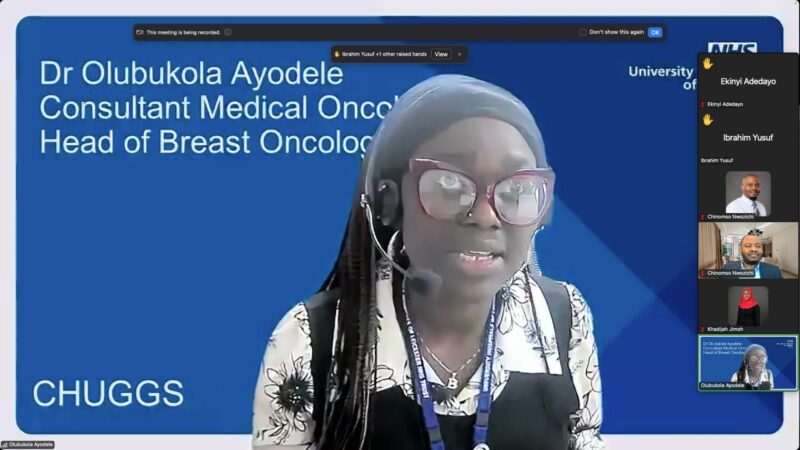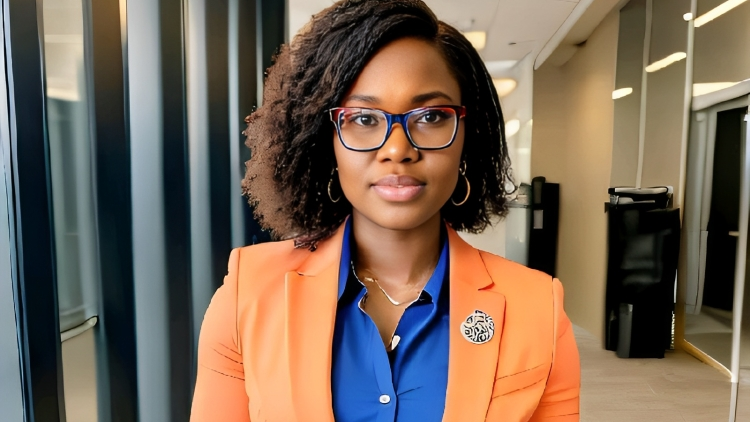Olubukola Ayodele, Consultant Medical Oncologist at the University Hospitals of Leicester NHS Trust, shared a post by Oncology Nursing Society of Nigeria (ONS- Nigeria), on LinkedIn, adding:
“It was such a pleasure to be part of the webinars series organised by Oncology Nursing Society of Nigeria (ONS- Nigeria). We had an impactful time with the audience being so engaged and enthusiastic. It fills my heart with so much hope for oncology care in Nigeria. A very big thank you to Chinomso (Chino) Nwozichi for asking me to speak about such an important topic on why breast cancer is such a big deal among Africans.
Five year survival rates in Sub-Saharan Africa is dismal with rates of less than 40%. 1 of 4 cancer deaths in Nigeria is from breast cancer, one of the highest in the world.
Why is breast cancer a bigger deal in Africans?
1. Biology: More aggressive subtypes such as triple negative breast cancer are prevalent. Even the hormone receptor positive disease are usually grade 3 and basal-like requiring more aggressive treatment approach. Also, diagnosis occur at younger ages compared to Western populations.
2. Late diagnosis: Majority of cases (70%) are diagnosed at stage 3 or 4. Also, the lack of screening and awareness programs give rise to presentation at later stages leading to poorer outcomes.
3. Treatment gaps: Limited access to advanced treatments (e.g, targeted therapies). Also, the poor healthcare infrastructure in many regions makes diagnosis of breast cancer so frightening.
Role is Oncology Nurses
Nurses are so vital in oncology as they provide holistic care.
Some of the roles highlighted include:
Patient Education: Providing culturally sensitive education on breast cancer prevention, symptoms and treatment. Addressing myths and stigma through open non-judgmental communication. Offering practical advice on managing side effects of treatment.
Advocacy: Advocating for better screening programs and access to care. Participating in professional organizations to stay informed and influence policy discussions.
Support systems: Encouraging family involvement in care to reduce stigma. Connecting patients to financial and social resources and creating support groups where patients can share their experiences and build resilience.
Research and data collection: participate in or support local studies and clinical trials. These patient data will help to identify trends, barriers and outcomes of patients. This also includes collaboration with international organizations to bring attention to the unique challenges faced by these women.
It was disheartening to hear that people are actively discouraged to go into oncology in Nigeria because everyone thinks that cancer is a death sentence hence lack of impact as a healthcare provider. The treatment of cancer has been revolutionize and we have people living for longer with better outcomes. The key is early detection as this is what saves lives.
I always delight in capacity building and I’m looking forward to the meaningful impact from our conversation yesterday.”
Quoting Oncology Nursing Society of Nigeria (ONS- Nigeria)‘s post:
“The Oncology Nursing Society of Nigeria (ONS- Nigeria) just concluded a powerful and insightful webinar titled “What’s the Big Deal About Breast Cancer Among Africans?”
We extend our deepest appreciation to our presenter, Dr Olubukola Ayodele, Consultant Medical Oncologist at the University Hospitals of Leicester NHS Trust, UK, for an outstanding presentation. She expertly demystified the biological, financial, institutional, and cultural-religious factors that impact breast cancer prevention, early detection, and treatment in Africa. The session was so engaging and thought-provoking that participants wished it could have lasted even longer!
At ONS Nigeria, we remain fully committed to transforming the role of oncology nurses in cancer care—not just in Nigeria, but across Africa and globally.
What’s Next?
We are in full gear preparing for the first-of-its-kind Oncology Nursing Conference in Abuja, Nigeria! This will be a landmark event shaping the future of cancer nursing practice, education, and research.
We invite nurses, healthcare providers, and patients to join us in revolutionizing cancer care! Stay tuned for more updates.
Let’s make a lasting impact together.”



